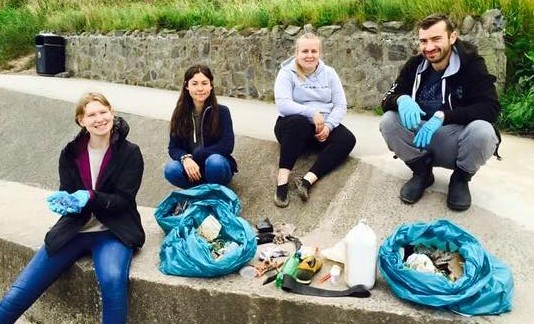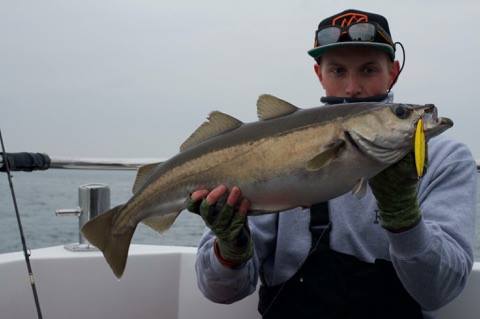Marine Life & Conservation
The ocean is suffering – here’s how you can help

The oceans are suffering. Around 8 million items of litter enter the marine environment every day; plastic is now the most common element found in the ocean. One hundred thousand sea mammals are killed in the ocean by pollution each year, and another three hundred thousand dolphins and porpoises die each year because of becoming entangled in ghost fishing gear.
Stopping pollution and removing pollution from the ocean is a momentous task. But everything begins with small steps; some can be done from the comfort of your own home, and some can be integrated into the classic bank holiday trip to the seaside.
Some ocean friendly choices are:
Use bags for life instead of normal plastic bags
A plastic bag can take between 150 years to over 1,000 years before it degrades. However, it doesn’t biodegrade, it’s broken down by light into tiny little fragments of plastic, which are toxic – these are known as microplastics. In relation to the ocean, an estimated 1,000,000 birds, 100,000 turtles, and countless other sea organisms die each year from ingesting plastic, according to Greenpeace. They can easily mistake plastic bags for jellyfish and other edible sea creatures. Using a reusable carrier bag prevents more plastic entering our oceans.
Join a beach clean
Bank holidays are always an excuse to visit the seaside – have some chips sat on the pier, watch the kids fight over who has built the best sandcastle… or you could join one of the many groups of people who spend their weekends/bank holidays cleaning the beaches. They collect washed up cans, plastic bottles, toys… all sorts of things! There are events organised all over the UK for people to take part in (here, here, here). Or you could organise you own! Maybe have an impromptu tidy up, making it a game for the children. To see some of the amazing things which have been found on beach cleans look here.
Recycle
Recycling 14 trees worth of paper reduces air pollutants by 165,142 tons. I know we’re discussing marine pollution, but ocean acidification is caused by the uptake of CO2 from the air, and recycling could potentially slow the rate of coral bleaching and save calcified organisms, which are damaged by increasing ocean acidity.
The dumping of used plastic destroys sea life at an estimated 1,000,000 sea creatures per year! Glass and plastic take the longest to degrade, but are completely recyclable, which is why it’s important we recycle them. It’s believed that 60%-70% of rubbish we put in our bins could have been recycled instead. Recycling doesn’t just reduce the amount of waste entering the ocean, it also reduces the amount of power we use. Theoretically, we could hit two birds with one stone. When we produce aluminium products from virgin metal it consumes close to 100 times the power required to recycle aluminium. In the UK an estimated 70% of our energy comes from non-renewable energy sources. If we use less energy we will lower the amount of air pollution, which I’ve already mentioned has horrific effects for our oceans.
Food scraps to compost
In 2009 it was found that an estimated 25% of food bought by households was thrown away. Food waste contains Nitrogen and Phosphorous which when in water can lead to eutrophication and algae blooms.
By collecting your food waste and using it to produce compost you are reducing your rubbish – and that compost can be used instead of artificial fertilizers.
Compost is great for the environment and great for you. It’s free to make and replaces somewhat expensive fertilizer and shop bought compost.
To find out how to set up your own compost look at my previous article here.
Purchase items with minimum packaging
When you go into a supermarket, it’s likely you will see more packaging that you will food. I know I do! Apples surrounded in Styrofoam holders swarming with plastic wrapping, bread suffocating in plastic bags…
To reduce your waste and plastic usage try and purchase items which come with less packaging, or at least recyclable packaging. Most plastic can be recycled, but make sure you read the packaging, and look for the recyclable symbol. Styrofoam is not recyclable and can take over 500 years before it typically begins to break down. In the ocean, Styrofoam is often mistaken for food and eaten; when inside an organism, it blocks the digestive tract and the organism will usually starve and then die.
Read the label
I will admit I am terrible for looking at labels when I’m shopping, but I try and check for the basics: sustainable fishing (the blue tick – if you want more information about how to shop for fish sustainably there is information here). I also avoid microbead products. Although they are now being phased out (UK and USA), it will still take years before they are completely gone from our shelves. A new one I will be adding to my list is cleaning products which contain phosphate which can lead to eutrophication (excessive richness of nutrients) and algal blooms (rapid growth of algae, which can cause oxygen reduction). A small change in your shopping habits can make a big difference to the ocean; for example, allowing fish stocks to increase.

Sustainably caught Pollack. Credit John Wheeler
On a positive note, we are making a difference – we are increasing the amount of power we receive from renewable sources; we are also reducing the amount of plastic we use. We’re moving forwards to a brighter future – one with a healthier ocean.
I hope these tips have given you a few ideas to help you lead a greener life, and to know that no matter how far away from the coast you are, you matter to it.
Marine Life & Conservation
Double Bubble for Basking Sharks

 The Shark Trust is excited to announce that, for two more days only, all donations, large or small, will be doubled in the Big Give Green Match Fund!
The Shark Trust is excited to announce that, for two more days only, all donations, large or small, will be doubled in the Big Give Green Match Fund!
Donate to Basking in Nature: Sighting Giants
The Shark Trust is hoping to raise £10k which will be doubled to £20k. This will go towards Basking in Nature: Sighting Giants. And they need YOUR help to reach they’re goal.
The Shark Trust’s citizen science project is to monitor and assess basking sharks through sightings; encouraging data collection, community engagement, and promoting nature accessibility. This initiative aims to enhance health and wellbeing by fostering a deeper connection with British Sharks.
Campaign Aims
- Increase citizen science reporting of Basking Sharks and other shark sightings to help inform shark and ray conservation.
- Provide educational talks about the diverse range of sharks and rays in British waters and accessible identification guides!
- Create engaging and fun information panels on how to ID the amazing sharks and rays we have on our doorstep! These can be used on coastal paths around the Southwest. With activities and information on how you can make a difference for sharks and rays!
- Promote mental wellbeing through increasing time in nature and discovering the wonders beneath the waves!
Donate, and double your impact. Click Here
Marine Life & Conservation
Leading UK-based shark conservation charity, the Shark Trust, is delighted to announce tour operator Diverse Travel as a Corporate Patron

 Corporate Patrons provide a valuable boost to the work of The Shark Trust. The Trust team works globally to safeguard the future of sharks, and their close cousins, the skates and rays, engaging with a global network of scientists, policymakers, conservation professionals, businesses and supporters to further shark conservation.
Corporate Patrons provide a valuable boost to the work of The Shark Trust. The Trust team works globally to safeguard the future of sharks, and their close cousins, the skates and rays, engaging with a global network of scientists, policymakers, conservation professionals, businesses and supporters to further shark conservation.
Specialist tour operator Diverse Travel has operated since 2014 and is committed to offering its guests high quality, sustainable scuba diving holidays worldwide. Working together with the Shark Trust will enable both organisations to widen engagement and encourage divers and snorkellers to actively get involved in shark conservation.
“Sharks are truly at the heart of every diver and at Diverse Travel, we absolutely share that passion. There is nothing like seeing a shark in the wild – it’s a moment that stays with you forever!” says Holly Bredin, Sales & Marketing Manager, Diverse Travel.
“We’re delighted to celebrate our 10th year of business by becoming a Corporate Patron of the Shark Trust. This is an exciting partnership for Diverse and our guests. We will be donating on behalf of every person who books a holiday with us to contribute towards their vital shark conservation initiatives around the world. We will also be working together with the Trust to inspire divers, snorkellers and other travellers to take an active role – at home and abroad – in citizen science projects and other activities.”
Paul Cox, CEO of The Shark Trust, said:
“It’s an exciting partnership and we’re thrilled to be working with Diverse Travel to enable more divers and travellers to get involved with sharks and shark conservation. Sharks face considerable conservation challenges but, through collaboration and collective action, we can secure a brighter future for sharks and their ocean home. This new partnership takes us one more valuable step towards that goal.”
For more information about the Shark Trust visit their website here.
For more about Diverse Travel click here.
-

 News3 months ago
News3 months agoHone your underwater photography skills with Alphamarine Photography at Red Sea Diving Safari in March
-

 News3 months ago
News3 months agoCapturing Critters in Lembeh Underwater Photography Workshop 2024: Event Roundup
-

 Marine Life & Conservation Blogs3 months ago
Marine Life & Conservation Blogs3 months agoCreature Feature: Swell Sharks
-

 Blogs2 months ago
Blogs2 months agoMurex Resorts: Passport to Paradise!
-

 Blogs2 months ago
Blogs2 months agoDiver Discovering Whale Skeletons Beneath Ice Judged World’s Best Underwater Photograph
-

 Marine Life & Conservation2 months ago
Marine Life & Conservation2 months agoSave the Manatee Club launches brand new webcams at Silver Springs State Park, Florida
-

 Gear Reviews2 weeks ago
Gear Reviews2 weeks agoGEAR REVIEW – Revolutionising Diving Comfort: The Sharkskin T2 Chillproof Suit
-

 Gear Reviews3 months ago
Gear Reviews3 months agoGear Review: Oceanic+ Dive Housing for iPhone






